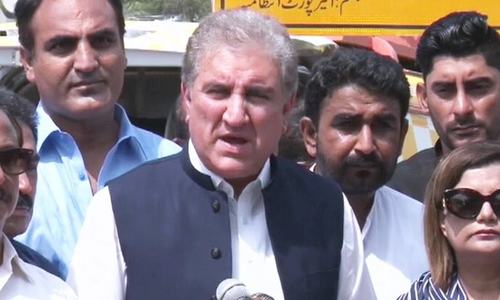The United Nations human rights chief on Monday said she was "deeply concerned about the impact of recent actions" by the Indian government on the human rights of Kashmiris.
In her introductory address for the start of the Human Rights Council's latest session, Michelle Bachelet aired concerns over India's actions against Kashmiris as well as unlawful killings and injuries of Palestinians by Israeli security forces.
Foreign Minister Shah Mahmood Qureshi left for Switzerland today on a three-day visit to represent Pakistan at the 42nd session of UN Human Rights Council in Geneva.
The foreign minister is expected to address the session and present the case of Kashmiris before the delegates attending the forum from across the world, Radio Pakistan reported.
On August 5, the government of Indian Prime Minister Narendra Modi stripped Kashmiris of the constitutional rights they had for seven decades through a rushed presidential order. Since then, an indefinite curfew has been in place in occupied Kashmir while elected leaders are still under house arrest.
Bachelet, in her remarks on occupied Kashmir, said her office continues to receive reports on the human rights situation on both sides of the line of control. "I am deeply concerned about the impact of recent actions by the Government of India on the human rights of Kashmiris, including restrictions on internet communications and peaceful assembly, and the detention of local political leaders and activists," she said.
"While I continue to urge the governments of India and Pakistan to ensure that human rights are respected and protected, I have appealed particularly to India to ease the current lockdowns or curfews; to ensure people's access to basic services; and that all due process rights are respected for those who have been detained," she urged.
"It is important that the people of Kashmir are consulted and engaged in any decision-making processes that have an impact on their future."
The foreign minister had last month written to the UN human rights chief to call upon India to end rights abuses in occupied Kashmir.
Qureshi, in a letter addressed to Bachelet, had asked her to demand from India to “rescind its unilateral actions, lift the curfew and other draconian measures, and restore fundamental rights of the Kashmiri people”.
Environmental concerns
The rights chief, who is a former president of Chile, put her main focus on environmental concerns, calling variously for greater participation in the fight against climate change by businesses and greater space for environmental activists to express their views.
“We are burning up our future literally,” Bachelet said. “The world has never seen a threat to human rights of this scope. This is not a situation where any country, any institution, any policymaker can stand on the sidelines.”
Looking past personal criticism against her from Brazilian President Jair Bolsonaro in recent days, Bachelet also reiterated her concerns about the “drastic acceleration of deforestation of the Amazon”.
“The fires currently raging across the rainforest may have catastrophic impact on humanity as a whole,” Bachelet said, “but their worst effects are suffered by the women, men and children who live in these areas, among them, many indigenous peoples.” She urged authorities in Brazil, as well as Paraguay and Bolivia, to ensure “longstanding environmental policies” are carried out, “thus preventing future tragedies”.
Last week, Bolsonaro praised the 1973 military coup by General Augusto Pinochet in Chile that led to Bachelet's father's death a year later in captivity. Asked by The Associated Press to respond to those comments, she declined to comment.
Migrant rights
As for migrants' rights in Central America and on the US-border, Bachelet said she was concerned that policies by the United States, Mexico and others in the region “are putting migrants at heightened risk of human rights violations and abuses”.
“Notably, I am alarmed that migrant children continue to be detained in centers in both the US and Mexico, contravening the best interests of the child, which is a fundamental tenet of international law,” she said, adding at least 35,000 asylum-seekers have been “pushed back” to Mexican border areas to wait for their hearings this year.
The Trump administration pulled the United States out of the council last year, accusing it of an anti-Israel bias and denouncing some member states that Washington says are repeat rights violators.
Alarmed by unlawful killings of Palestinians
As for Israel, whose government has repeatedly accused the council of anti-Israeli bias, Bachelet decried “very high levels of settler violence, and Israel's failure to adequately protect Palestinians from such attacks or hold the perpetrators to account”.
She cited a recent increase in demolitions of homes under an Israeli zoning and planning framework “which discriminates heavily against Palestinians”.
“I continued to be alarmed by reports of unlawful killings and injuries of Palestinians by Israeli security forces across the entire occupied territory, accompanied by a lack of full accountability for instances of possible excessive use of force,” she said.














































